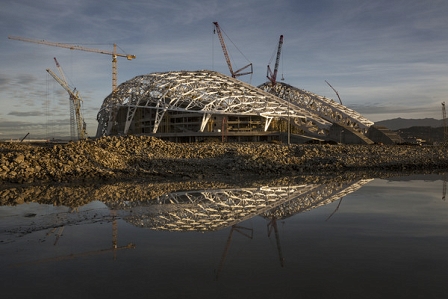Erstellt am: 7. 2. 2014 - 16:23 Uhr
Where Has All The Money Gone?
“Many Russians are feeling very patriotic and very enthusiastic that their country is hosting the Olympics,” says FM4 Reality Check’s Russia correspondent Tom Barton.
Join me for a Saturday Reality Check Special on The Shadows of Sochi this Saturday 8th Feb at 12 noon!
When Sochi, a palm-fringed beach resort which is officially Russia’s warmest city, was announced as the host of the Games at a ceremony in Guatemala City back in 2007, 30,000 people had gathered in Sochi city centre just to await the announcement, although it was 4 am local time.
When IOC President Jacques Rogge announced that the Black Sea resort would be the first Russian city to host Winter Games they erupted in joy.

Brent Stirton/ Human Rights Watch
Defeating rival bids from Salzburg and Pyongchang in South Korea was a victory of prestige.The city, formerly best known for the antiquated sanatoriums that Stalin built to restore the health of Soviet workers, had been given a chance to reinvent itself as the shop-window for a resurgent nation.
President Vladimir Putin, who had lobbied intensively for the right to host the Games, told Russians it was a chance to showcase “modern Russia”.
"Eye-Watering Costs"
But enthusiasm has been dampened by the massive costs of the Games. These will be the most expensive Olympic Games in history. “The figures are quite eye-watering”, says Barton.
The most often quoted figure puts the eventual cost of the Sochi Olympics at $51 billion dollars. By contrast, the previous Winter Olympics, which were hosted by the Canadian city Vancouver, cost a mere $7 billion dollars. In fact Sochi is said to have been more expensive than the cost of all the other previous Winter Olympics combined.
“Many Russians see it as an abject waste of money and are very angry,” says Barton.
Regional Development or Vanity Project?
Most of the sporting infrastructure had to be built from scratch. At the time the Russian delegation was given the good news in Guatemala City, Sochi didn’t even possess an ice-rink. In seven years it has built the Bolshoi Ice Palace, the beatle-like Fisht Stadium and the speed-skating Arena. New roads, new rail links, hotels and bus terminals have connected the new venues together.

APA: Hans Klaus Techt
Of course this largesse to a once impoverished corner of Russia could be seen as a positive development. Many rural Russians have complained for years that government investment was overly focussed on the capital Moscow and the Kremlin argues that much of the costs quoted were infrastructure projects that were needed, and indeed planned, even before the Olympics were awarded to the Caucasus mountains.
Critics, however, feel that the money could have been better spent. “30 million Russians lack hot water and proper sanitation,” says Moscow-based FM4 correspondent Charles Maynes. With parts of the country facing such deprivation, Putin’s opponents say this is no time for Presidential vanity projects.
"Nothing But A Monstrous Scam"
The most serious accusation levelled against the organisers of the Sochi Olympics is that much of the money was wasted or embezzled. Liberal politician and Kremlin critic Boris Nemtsov claims that half of the money has been syphoned off into the pockets of corrupt officials and friends of President Putin. He has called the Sochi Olympics “nothing but a monstrous scam.”
His claims were backed up this week on a website launched by anti-corruption activist Alexei Navalny. The site offers "evidence" that Russia spent twice as much as necessary to build at least 10 of the Olympic venues. “Frankly,” says Maynes, “a lot of the contracts went to Putin’s inside buddies. These are old friends of his who were awarded contracts. It doesn’t appear that there were many competitive tenders.”
Bags of Cash And Road Lined In Truffles
The trickle of corruption allegations became a flood in the weeks running up to the Games. Whistle-blowers have told the BBC of bags of cash being handed to public officials in Sochi restaurants. It is claimed that a $2.5billion building contract went to the man who just happens to be Vladimir Putin’s personal ski instructor.
One of the most talked about stories is of the money spent on a road that connects Sochi to the skiing venue in the mountains. The road only measures 50km but is estimated to have cost between 8 and 9 billion dollars. Russians have been scratching their heads trying to work out how it could have possibly cost so much: “Some people have estimated that it would have been cheaper to pave the road in a six inch deep layer of truffles,” say Fm4’s correspondent Tom Barton.
Forced Evictions and Man-made Landslides
Then there is the human cost. “The Russian government is building the most expensive Olympics in history, but many Sochi residents have paid a very high personal price for these games,” says Jane Buchanan, from Human Rights Watch.
2,000 people were moved to make way for the gleaming venues and new roads. Buchanan says her team has documented “forced evictions, people who are kicked out of their homes in order to make way for Olympic venues and infrastructure and didn’t receive fair or in some cases any compensation.”
Human Rights Watch says it documented cases of homes that had been severely damaged by a landslide caused by illegal dumping of construction and that many migrant workers – the calloused hands who helped transform Putin’s vision from paper to concrete reality – have seen “non-payment of wages or delays in their wages.”
Buchanan says that it is not too late to right those wrongs – by investigating the claims of the disenfranchised and where necessary providing adequate compensation:
“The hosting of a successful winter Olympic Games is completely within Russia’s hands. And it is fully capable and it’s fully within its power to ensure that people don’t suffer as a result of the games.”
Dieses Element ist nicht mehr verfügbar


